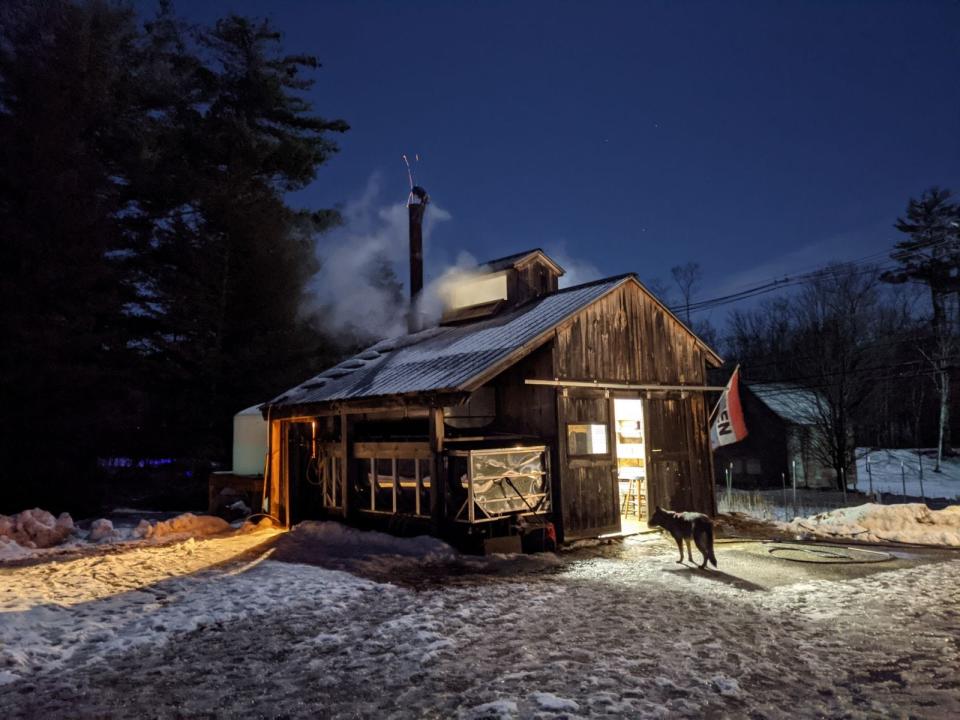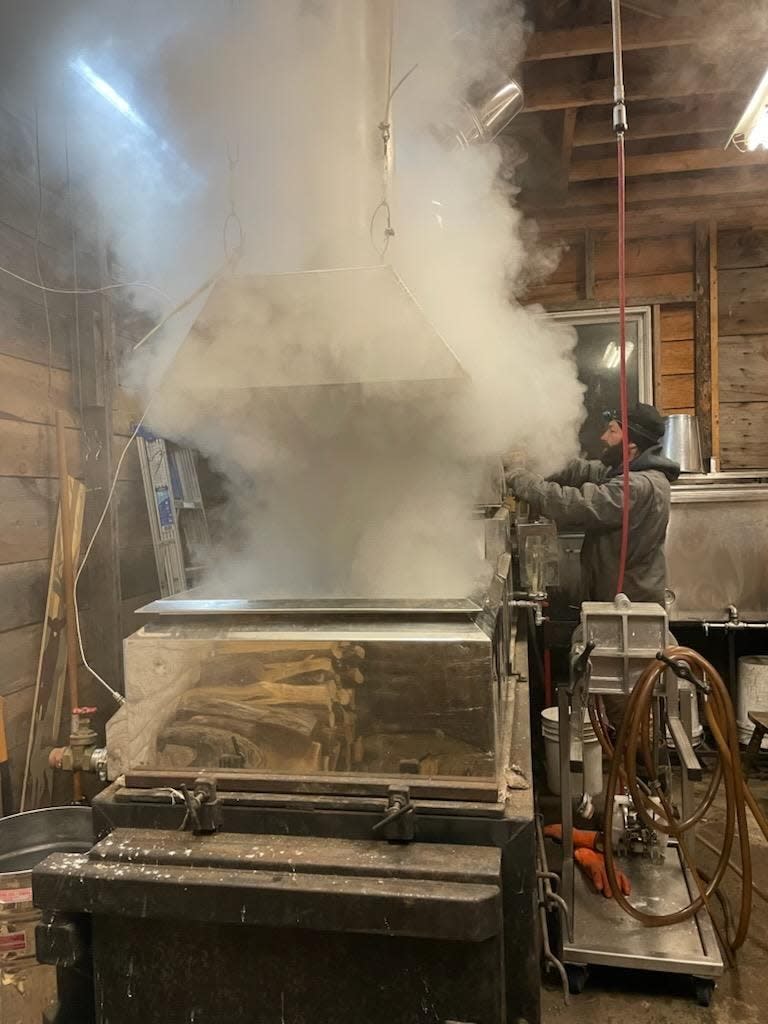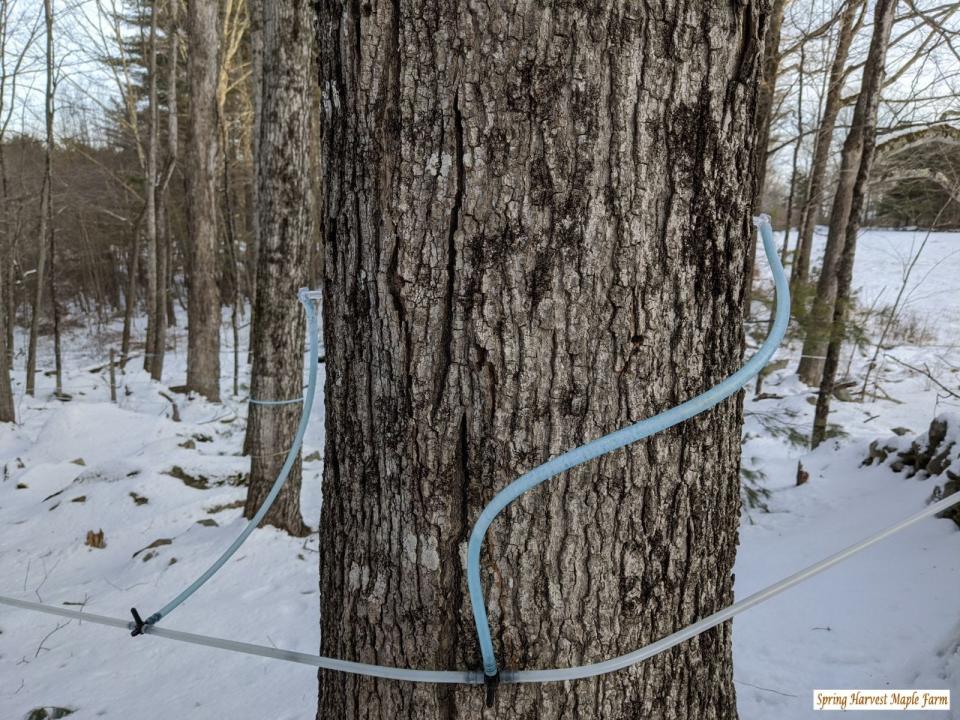Maple sugarhouses in Seacoast, NH see climate effects but a sweet season in 2024
BARRINGTON — El Nino and climate change are affecting New Hampshire maple producers this year, but sugarhouses are still ready to welcome visitors across the state this weekend for Maple Weekend.
“It’s kind of like the Super Bowl event for maple producers,” said Andrew Chisholm, the president of the New Hampshire Maple Producers Association. Sugarhouses will provide visitors with samples and maple treats from maple cream to maple nuts to maple cotton candy.
Maple sugaring season started very early this year, likely due to a combination of El Nino and climate change, producers say. While warm weather stopped sap from flowing last Monday, Chisholm said, recent cooler temps provided a reset, and he is optimistic there will be a good showing on Maple Weekend.
What to expect during NH Maple Weekend

On Maple Weekend, farms from all across the state welcome hundreds of visitors. Josh Bouchard, owner of Spring Harvest Maple Farm in Barrington, said the weekend accounts for 30-40% of his yearly income.
When you go to a sugarhouse in New Hampshire, Chisholm said, the producer can show you exactly which trees that maple syrup comes from. And it’s not just maple syrup they offer, but “free samples of things that they haven’t even imagined,” Chisholm said: maple barbecue sauce, maple cranberry, maple mustard, etc.
“If you go to a small sugarhouse in New Hampshire on Maple Weekend,” Chisholm said, “you're gonna see the trees and next to the sugarhouse, you're gonna see the evaporator going, you're gonna see the sugar maker that makes that syrup, you're gonna see the family that's been doing it for potentially four or five generations. It’s a really unique weekend.”
There are several sugarhouses in the Seacoast area, including Spring Harvest Maple Farm and Barbin’s Tap’n Shack in Barrington, San -Wal Farm in Lee, and Syrup by the Sea in Portsmouth.
At Spring Harvest Maple Farm in the sugarhouse, Bouchard hands out samples of different grades of maple syrup and sugar: golden amber, dark and very dark. Outside, they sell maple nuts, popcorn, candy, cream, and anything else they’re trying out. They also try to give the public ideas on what else they can do with maple syrup.
“People are only going to make so many pancakes,” said Bouchard. “But if you can cook with it, it opens up a whole new world of things you can do with maple. So usually every year we'll try to come up with a couple of different recipe ideas and hand them out as samples.”
Bouchard also tries to make a visit to his sugarhouse an educational one, and said he’s talked about sugaring to many University of New Hampshire students who have stopped by.
El Nino, climate change affect maple sugaring in New Hampshire

Chisholm has been sugaring for over 40 years, starting at about 8 years old.
“I'd run home, dropped my books off and go up and jump on the back of the truck and we’d go collect sap by the 450 buckets,” he said.
Maple season used to line up with New Hampshire school vacation in late February and April, when there were the cold nights and warm days needed for sap to flow. But in recent years, the season has moved earlier.
“If we were going to redesign those school vacations, I think they’d move them to like the first week in February, and the first week in April,” said Chisholm. “That's kind of the footprint of our season right now.”
Some producers started tapping trees as early as January, a month earlier than what is historically usual. Chishom said this year’s early start is “textbook” for what you would expect during an El Nino year, which brings warmer-than-average temperatures to the northern tier of the U.S.
But lately, the early start is becoming more commonplace – last year, producers also started tapping in January.
A 2019 study by scientists at institutions including the University of Massachusetts and Dartmouth found the timing of sap collection across North America gets earlier by about four days and sap sugar content declines for every 1 degree Celsius increase in March mean temperature. By 2100, this study found that the “region of maximum flow is expected to shift northward by 400km, from near the 43rd parallel to the 48th parallel.” In the Northeast, this means the optimal region would switch from the latitude of Manchester, New Hampshire to the border between Quebec and New Brunswick in Canada.
Bouchard’s experience this season reflected this study: On March 9, he was already halfway through his sap production, but his syrup production was behind. Large chunks of cold temperatures are needed for trees to turn the starch they stored during the summer into sap. This year's warm winter means there’s not as much sugar in the sap, which is boiled to create syrup.
Another study on climate change and maple syrup found 89% of surveyed producers — the majority were from New England and 14% were from New Hampshire — have experienced the negative impact of climate on maple syrup production. Forty percent feel concerned regarding the future of the maple syrup, and 39% feel hopeful.
“Fifty years I think is a timeframe where we’ll be lucky if we’re making syrup here,” said Bouchard. But he also said that tapping technology has improved to allow producers to tap earlier and for longer, which might explain some of the earlier season in 2024.

The same study found that the majority of producers have adapted their harvesting practices to climate effects, through methods like changing the type and number of taps and sap processing practices like reverse osmosis, which reduces the water content.
“In the near term, we’ll be fine regarding climate change” said Bouchard. “Our season will just keep getting earlier.”
Despite the low sugar content, Bouchard thinks they'll still do well production-wise, and sales are strong.
Bouchard started doing this as a hobby, not expecting it would take off like it has. He has a day job as a civil engineer, but during maple sugaring season he works at the sugarhouse most nights and weekends. He said he likes the fact his whole family can get involved and it exposes his kids to something different.
"It's just so cool that something that I do attracts people like it does, and the people I get to meet that have been coming here for 10, 15 years and just continue to come back year after year," Bouchard said. "It truly blows me away."
This article originally appeared on Portsmouth Herald: Maple Weekend NH looks sweet as season keeps moving earlier

